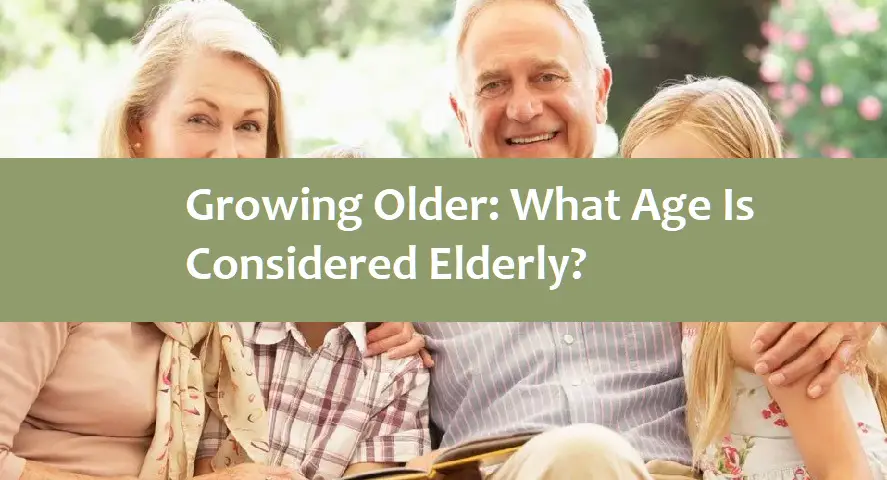Aging is an inevitable part of life, and as individuals grow older, they often wonder at what point they can be considered elderly. The concept of “elderly” can vary depending on cultural, societal, and individual perspectives. In this article, we will explore different aspects of what age is considered elderly and delve into the nuances surrounding this term.
What Age Is Considered Elderly?
The age at which an individual is considered elderly is subjective and can vary across different contexts. Traditionally, the age of 65 has been widely used as the benchmark for reaching old age, primarily due to the establishment of retirement benefits and eligibility for social security in many countries. However, as our understanding of health, longevity, and societal norms evolves, so does our perception of old age.
Is 60 Years Old Considered Elderly?
The age of 60 has often been associated with the beginning of senior citizenship, but it may not necessarily be considered elderly. Many individuals in their sixties continue to lead active, independent lives and remain in good health. With advancements in healthcare and increased emphasis on maintaining physical and mental well-being, individuals in their sixties are often regarded as middle-aged rather than elderly.
What Is the Difference between the Old and the Elderly?
While the terms “old” and “elderly” are often used interchangeably, they can have different connotations. “Old” generally refers to an advanced stage of life beyond middle age, whereas “elderly” typically implies a state of being old in terms of age-related frailty or diminished capabilities. It is important to note that not all older adults are necessarily elderly, as many individuals maintain their vitality and vitality well into their later years.
At What Age Is a Woman Considered Old?
Similar to men, the age at which a woman is considered old is subjective and can vary. Societal attitudes towards aging and gender play a significant role in determining the perception of age in women. Historically, women have faced more pressure to conform to societal standards of youthfulness and beauty, leading to an emphasis on youth in relation to femininity. However, with changing perceptions and increased focus on women’s empowerment, the idea of what age constitutes old for women is evolving. It is crucial to respect individual preferences and not impose rigid age-related stereotypes on women.
Is It Rude to Say Elderly?
The term “elderly” can sometimes carry negative connotations or be viewed as disrespectful, particularly when used in a derogatory or demeaning manner. It is essential to approach the topic of aging with sensitivity and respect for individuals’ dignity. Some older adults may prefer terms such as “senior” or “older adult” as they perceive them as less stigmatizing. Ultimately, it is best to use language that reflects a person’s individuality and values while avoiding generalizations or assumptions based solely on age.
Is 80 Years Old Considered Elderly?
As medical advancements continue to increase life expectancy, the perception of old age has shifted. While reaching 80 years old was once considered a significant milestone, it may not necessarily be seen as elderly in today’s society. Many individuals in their eighties remain active, engaged, and continue to contribute to their communities. However, it is important to acknowledge that the aging process affects individuals differently, and some may experience health challenges or require additional support in their later years.
Tips for Coping with Changes Associated with Growing Older
As individuals grow older, they may face various changes and challenges that come with aging. Coping with these changes requires adapting to new circumstances and maintaining a positive outlook on life. Here are some tips on how to cope with changes associated with growing older!
Maintain a Healthy Lifestyle
Taking care of your physical and mental health is crucial. Eat a balanced diet, engage in regular exercise, get enough sleep, and avoid harmful habits such as smoking and excessive alcohol consumption. Staying physically active can help maintain strength, flexibility, and overall well-being.
Stay Socially Engaged
Maintaining social connections is vital for emotional well-being. Stay connected with family, friends, and the community. Join social groups, clubs, or organizations that align with your interests. Engaging in social activities can provide a sense of belonging, reduce feelings of isolation, and foster a support network.
Embrace Lifelong Learning
Continuously challenge yourself intellectually by learning new skills or pursuing hobbies and interests. Engaging in lifelong learning not only keeps your mind sharp but also provides a sense of purpose and fulfillment. Take up a new hobby, enroll in classes, or explore online learning platforms.
Adapt to Changes
Accept that change is a natural part of life and be open to adapting to new circumstances. Recognize that aging may bring physical limitations or changes in abilities. Instead of dwelling on what you can no longer do, focus on what you can still accomplish and find alternative ways to engage in activities you enjoy.
Seek Emotional Support
If you find yourself struggling with the emotional aspects of aging, don’t hesitate to seek professional help or talk to a counselor. Aging can sometimes bring about feelings of loss, anxiety, or depression. Speaking with a mental health professional can provide you with the necessary tools and support to navigate these challenges.
Maintain a Positive Mindset
Cultivate a positive attitude towards aging. Focus on the wisdom and life experiences you have gained over the years. Celebrate the accomplishments and milestones you have achieved. Embrace the opportunities that come with aging, such as newfound freedom and the ability to pursue personal interests without the pressures of earlier stages of life.
Plan for the Future
Take proactive steps to plan for your future, including financial and healthcare considerations. Create a will, consider long-term care options, and discuss your preferences with loved ones. Planning ahead can alleviate stress and provide a sense of security as you age.
Practice Self-Care
Prioritize self-care and make time for activities that bring you joy and relaxation. Engage in activities such as meditation, yoga, reading, or spending time in nature. Taking care of your emotional and physical well-being is essential for maintaining a positive outlook and coping with the changes that come with growing older.
Key Takeaways
Determining the age at which someone is considered elderly is a complex and subjective matter. Cultural, societal, and individual perspectives all play a role in shaping our understanding of old age. While traditional benchmarks such as retirement age and eligibility for benefits have influenced our perception of old age, advancements in healthcare and evolving societal attitudes towards aging have challenged these notions.
Remember, aging is a unique and individual journey. Embrace the process, celebrate your achievements, and seek support when needed. By taking care of yourself and staying engaged in life, you can navigate the changes associated with growing older with grace and resilience.

Morgan Elfman is a compassionate writer, dedicated caregiver, and passionate advocate for senior well-being. Born and raised with a deep sense of empathy and a natural inclination towards service, Morgan has devoted her life to making a positive impact on the lives of seniors.
As a writer for www.choiceseniorlife.com, Morgan utilizes his skills to create insightful and informative content that addresses the unique needs and challenges faced by seniors and their families. Her articles not only provide valuable information on health, lifestyle, and care options but also strive to inspire and empower seniors to lead fulfilling lives.

